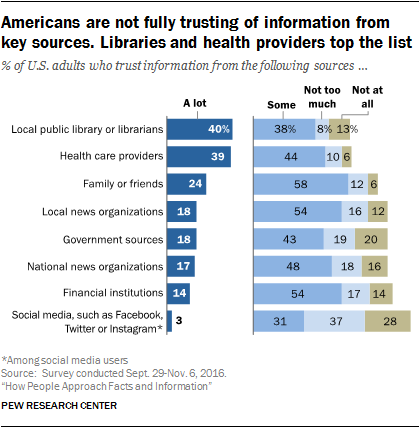Pew Research Center Publishes Survey Findings on “How People Approach Facts and Information” and Role For Libraries/Librarians
Below are a few highlights from the new Pew Research Center report. The complete report is available in HTML and also as in PDF (35 pages).
From Pew Research:
When people consider engaging with facts and information any number of factors come into play. How interested are they in the subject? How much do they trust the sources of information that relate to the subject? How eager are they to learn something more? What other aspects of their lives might be competing for their attention and their ability to pursue information? How much access do they have to the information in the first place?
A new Pew Research Center survey explores these five broad dimensions of people’s engagement with information and finds that a couple of elements particularly stand out when it comes to their enthusiasm: their level of trust in information sources and their interest in learning, particularly about digital skills. It turns out there are times when these factors align – that is, when people trust information sources and they are eager to learn, or when they distrust sources and have less interest in learning. There are other times when these factors push in opposite directions: people are leery of information sources but enthusiastic about learning.
[Clip]
Libraries and Librarians
Beyond people’s interest in topics, the survey looked at people’s trust in eight information sources. [Our emphasis] Libraries and health care providers top the list of the most trusted sources that were queried, while social media is at the bottom.
Overall, 30% of American adults say they do not say trust any information source on our list “a lot.” On average, American adults trust 1.7 of the eight sources “a lot.”
[Clip]
Additionally, the survey sought insights about time pressures and other stresses in people’s lives that might tie to their ability and interest to engage with information. First, 39% of internet users (35% of all adults) say they “occasionally” or “frequently” could use help finding the information they need online. These answers were strikingly different across the various typology groups. Second, 52% of Americans say this statement describes them very well: “I’m usually trying to do two or more things at once.” Third, 37% of adults say this statement describes them very well: “Trying new things is stressful for me.” Fourth, 41% of the public says “I am usually patient when I have to wait in line doing day-to-day errands” describes them very well. Again, there was notable variance across the different groups in the way people answered these questions.
Finally, the survey covered the basic technology inventory of people’s lives and found that three kinds of tools and access mattered to the typology. In this survey, 77% of respondents have a smartphone; 73% have a home broadband subscription; and 51% have a tablet computer. Some 42% of adults have all three, and we think of this as “access abundance.” Statistical modeling showed those with such abundance had different engagement compared with those who two or fewer of those access tools.
[Clip]
Role for Libraries and Librarians
These findings complement previous Pew Research Center surveys about how people think about the role of libraries, particularly in helping meet the information needs of their communities. For instance, previous Center surveys have found that 80% of those ages 16 and above think libraries should offer digital skills training, especially for older adults and kids. Similar numbers (76% of those ages 16 and older) say libraries should definitely have programs to teach patrons about online privacy and security.
This new survey contained a battery of new questions about the ways libraries might contribute to people’s information needs. Majorities of Americans think libraries help them with information issues:
- 78% say their local library helps them find information that is trustworthy and reliable.
- 76% believe libraries help them learn new things.
- 65% argue that libraries help them grow as people.
- 56% maintain that libraries help them get information that helps them make decisions.
Direct to Full Text Report ||| PDF Version (35 pages; PDF)
Filed under: Libraries, News, Patrons and Users
About Gary Price
Gary Price (gprice@gmail.com) is a librarian, writer, consultant, and frequent conference speaker based in the Washington D.C. metro area. He earned his MLIS degree from Wayne State University in Detroit. Price has won several awards including the SLA Innovations in Technology Award and Alumnus of the Year from the Wayne St. University Library and Information Science Program. From 2006-2009 he was Director of Online Information Services at Ask.com.





